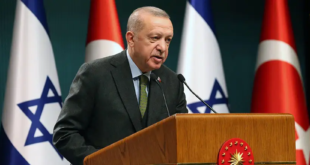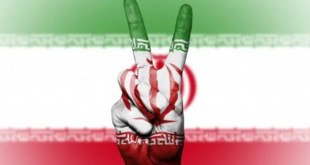BAGHDAD (AP) — Thousands of Sunni demonstrators rallied in Saddam Hussein’s hometown of Tikrit on Monday to denounce Iraq’s new constitution a day after negotiators finished the new charter without the endorsement of Sunni Arabs.
Sunni leaders have urged their community to defeat the charter in a nationwide referendum on October 15, saying it had been rammed through the drafting committee by the dominant Shiite Arab and Kurdish alliance.
The absence of Sunni endorsement, after more than two months of intensive negotiations, raised fears of more violence and set the stage for a bitter political fight ahead of the referendum. A political battle threatened to sharpen communal divisions at a time when relations among the Shiites, Sunnis and Kurds appear to be worsening.
To encourage Sunnis to vote in the October referendum, election authorities Monday postponed the deadline for voters to register by one week in the western province of Anbar, a rebellious Sunni stronghold where turnout in the January election was minimal.
In Tikrit, at least 2,000 protesters assembled near the office of the Association of Muslims Scholars — a hardline Sunni clerical group opposed to the US occupation — carrying Iraqi flags and portraits of the former dictator.
“We sacrifice our souls and blood for you, Saddam,” chanted the demonstrators.
They carried pictures of Shiite clerics Moqtada Sadr and Jawad Khalisi who have joined the Sunnis in opposing the constitutional draft.
Sheikh Yahya Ibrahim Batawi, an organiser of the protest, read a statement denouncing the “Jewish constitution,” saying its goal was to divide Iraq along sectarian and ethnic lines — a reference to the plan to transform the country into a federated state.
Sunni negotiators delivered their rejection in a joint statement Sunday shortly after the draft was submitted to parliament. They branded the final version as “illegitimate” and asked the Arab League and the United Nations to intervene.
“If the constitution was not changed, then we will try to bring it down either before the referendum through the law by filing a suit in international or local courts,” Saleh Mutlaq, a top Sunni negotiator told Jazeera television.
“It is considered dissolved,” said Mutlaq in reference to the parliament. He added that since a major group did not agree on this constitution then “this constitution should not pass.” But the depth of disillusionment over the charter in the Sunni establishment extended beyond the 15 negotiators, who were appointed to the constitutional committee in June under US pressure.
In Baghdad, the secretary-general of the country’s largest Sunni party told reporters the draft “does not represent our hopes and aspirations” and does not fulfill “our legitimate national principles.” “The draft has been submitted in the absence of the principle of compromise,” said Tariq Hashimi of the Iraqi Islamic Party, which had representatives on the Sunni negotiating team.
President George W. Bush expressed disappointment that the Sunnis did not sign on but pinned his hopes on the referendum.
Major debreaker issues included federalism, Iraq’s identity in the Arab world and references to Saddam Hussein’s Sunni-dominated Baath Party.
Prime Minister Ibrahim Jaafari said on Sunday the new constitution meant the end of “personal rule that destroyed many nations and peoples.” “There is no place for the Baath Party in Iraq after it shed blood and destroyed the country,” he said. “We will protect those who joined it but were not criminals and we will even protect the families of the criminals.” Sunnis fear federalism would lead to the breakup of the country into a Kurdish north and Shiite south, deprive Sunnis of Iraq’s vast oil wealth concentrated at the opposite ends of the country, and open the door to Iranian influence in the Shiite south. Sunnis also wanted no reference to Saddam’s party, fearing that would lead to widespread purges of Sunnis from government jobs.
Although Sunnis account for only 20 per cent of Iraq’s estimated 27 million people, they still can derail the constitution in the referendum due to a concession made to the Kurds in the 2004 interim constitution. If two-thirds of voters in any three provinces reject the charter, the constitution will be defeated. Sunnis have the majority in at least four provinces.
Defeat of the constitution would force new elections for a parliament that would begin the drafting process from scratch. If the constitution is approved, elections for a fully constitutional parliament will be in December.
Communal tensions have risen since the Shiite-dominated government was announced April 28. Both Shiites and Sunnis accuse the other of assassinating members of the rival sect. Shiites and Kurds dominate the government security services, while most insurgents are believed to be Sunnis.
In other developments on Monday:
— Two rockets slammed into the parking lot of the oil ministry building wounding an employee and damaging several vehicles, police said. Only one missile exploded; the other failed to detonate.
— Unidentified gunmen shot and killed Brig. Gen. Numan Salman Faris, director of the district rapid response force in Baghdad’s Azamiyah district.
—The Iraqi Islamic Party accused the government’s Shiite-led security forces of being behind the recent killing of 36 Sunnis.
 Eurasia Press & News
Eurasia Press & News



